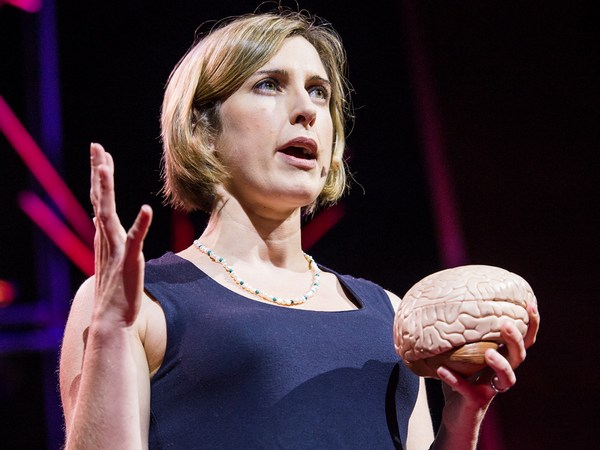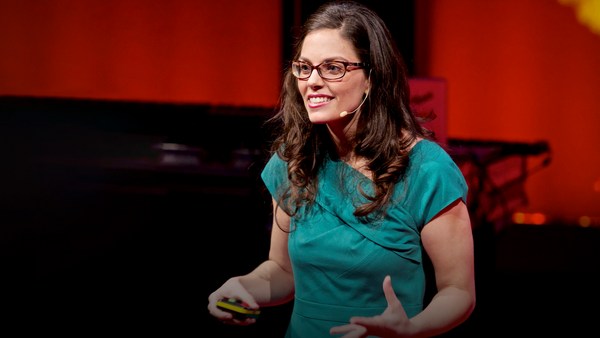I absolutely love horror movies - "The Conjuring," "The Ring" - you name it, I have watched it. (Laughter) That eerie feeling of someone standing behind you, or that hand trying to grab your leg from under the bed. (Laughter) And my favorite - someone watching you while you are sleeping. (Laughter) I love the "Oh, my God" feeling I get when I watch horror movies. But what I absolutely don’t want is to be in a horror movie in real life. (Laughter) But unfortunately, I realized I was in one eight years ago when I did my first public presentation. (Laughter) That same eerie feeling of someone watching you, only for real this time. And not just some one, but a room full of scientists, who, for whatever reason, did not look very happy that day. (Laughter) My amygdala was working harder than it ever had to in the past 23 years of my life. Amygdala - a region in our brain that helps us express emotions, including fear. Whenever we sense danger around us, the amygdala tells our body how to respond. That day, I came out of the meeting room with a hyperactivated amygdala, (Laughter) feeling very dejected. I could not help but ask myself, "What just happened back in there?" For the first time in life, I felt the doom of stage fright. What is it about stage fright that gets to us so easily? How is it different from other types of fear that we face in life? Consider driving. Just last year, over 1,500 people lost their lives on the streets of Georgia in car accidents. That means, on average, five people died every day. But we don’t leave our house every single time thinking we may die in a car accident today, right? But every time we have to get on the stage in front of people, we can almost feel death. (Laughter) Why? Social biologist Edward O. Wilson argues that, historically, being intently scrutinized or singled out is a prelude to being eaten up by a predator. Imagine yourself in a jungle. You’re all by yourself, and the tiger is staring at you, intently scrutinizing you. (Laughter) That probably means you are going to get eaten up. (Laughter) Amygdala was hyperactivated once again. Now, the correlation here - to be eaten up is our worry about self-reputation and the predator is beloved public speaking. "What if I fail in front of the crowd?" "What if everybody thinks I’m an idiot?" All those feelings cross our mind. Now, let’s get back to the example of driving. It is really hard to live in present times without knowing how to drive. I remember back in college when I did not have the luxury of owning a car. A trip to Walmart meant changing two buses, a train, and 20 minutes of walking. (Laughter) Now, that’s not convenient. So despite all the risk, stress and hassle of driving, we nevertheless put ourselves in the situation and get better at it anyways. But when it comes to standing in front of a crowd and speaking, we tell ourselves that we don’t need it, this is something we can live without. What is the problem with that? When we say that to ourselves repeatedly, we engage our brain in a process called negative reinforcement. Negative reinforcement is defined as strengthening of a behavior response by avoiding a negative stimulus. Of course, in this case, the behavior response that we are strengthening is our fear response, and the negative stimulus is getting up on the stage. Behavior analysts have noted that every time we have to get up in front of a crowd, we broadly adopt two strategies. Strategy one is avoidance. Anything to do with public speaking, any assignment - "I’m not doing it," "Let’s avoid it," "I don’t need it." The second strategy we adopt is to try and eliminate the fear completely. We suffer through the process; we practice really hard in the hope that we will be able to eliminate the fear. But the problem with both those strategies is that they're going to fail because we are constantly reinforcing the fear in our head, that this is bad, we should eliminate it. This is bad. We don’t want it. The only way to thwart negative reinforcement is to actually be in the presence of the stimuli as much as we can. As the famous saying goes, you’ve got to get back on the horse that threw you. Therefore, friends, I want to propose an idea today. How about we make stage fright a habit? (Laughter) "Habit" in neuroscience is defined as a routined behavior that is repeated regularly and it tends to occur subconsciously. We all have habits. We wake up in the morning, brush our teeth, make our pot of coffee, make our bed - well, hopefully, some of us do. (Laughter) But interestingly, we don’t really pay a lot of attention to it while doing it. It is almost as if something keeps happening in the background automatically while we focus on more important things in life, for example, how our day is going to look like. Habit is formed in another brain region called basal ganglia. When we engage in a new situation, our brain is hyperactive, trying to deal with it. But as we engage ourselves more and more, the brain gets a lot less active. The brain gets habituated, and the habit is formed in the basal ganglia. Let me tell you another story. A Nobel Prize winner was relaxing in the comfort of his home after he heard the news that he won the Nobel Prize. A reporter showed up at the door and asked, "Sir, are you surprised? Are you happy?" The elderly gentleman replied, "Yes! I’m very surprised and super happy." A few minutes later, another reporter showed up at the door and asked, "Sir, are you surprised? Are you happy?" The elderly gentleman replied, "Yes. I’m surprised. I’m happy." Two hours later, the twentieth reporter showed up at the door and asked, "Sir, are you surprised? Are you happy?" The elderly gentleman now responds, "How long can a man remain surprised and happy?" (Laughter) How about we apply the same concept of habituation to stage fright? We get up on the stage the first time, we feel the symptoms of stage fright. We get up on the stage the second time, we still feel the symptoms of stage fright. But when we get up on the stage the twentieth time, we feel the symptoms of stage fright, but a lot less. Now my brain says, "Hey! I have seen stage fright 19 times before, and it’s getting boring." (Laughter) "How about we focus on something more interesting, like the speech content, the speech delivery, eye contact with the audience, etcetera, etcetera, etcetera." (Laughter) After I moved to Dallas in 2009 to pursue my higher education, my life was not easy. As you know by now, I have an accent, so people had a lot of hard time understanding me. And studying in Texas, I was talking to a group of Southerners, so I could not understand them either. (Laughter) But there’s one thing that I realized - that if I want to move ahead in life, I cannot avoid public speaking. I have to get up on the stage. And therefore I decided to avail every single opportunity I could to get up on the stage and talk. I became part of an organization called Toastmasters International, which helps people become better speakers and leaders. They do a lot of other interesting things, but they have a secret recipe, and the secret recipe is to learn by doing. Now being a member of that organization for more than six years, I have had the opportunity to just get up in front of the public and speak at least 200 times or more. I still get stage fright. Yep. In fact, I have it right now, thinking how all you predators might try to eat me up. (Laughter) But my brain pays less attention to it. My brain got habituated to the fear. Instead of the stage fright, now I can focus on the lovely audience sitting in front of me. Interestingly, when you drive for a long period of time and get better at driving, the probability of getting into an accident does not reduce drastically. You may ask, "How?" Well, in the beginning, the probability of getting into an accident is high because of your poor driving skills. Later, the probability of getting into an accident is still high because of your poor texting skills. (Laughter) The risk is always there. It’s just that our brain gets used to the risk. Now we keep our insurance details handy in case we get into any trouble; we don’t think about it every single time. So what I would suggest to you, my friend, is speak often. And more importantly, speak in front of a large variety of crowds. Speak at work. Speak in your community. Speak in front of your friends and families - especially friends and family because they can be brutally honest. (Laughter) But don’t tell yourself that this is something you can live without. Don’t tell yourself that this is something you don't need. Do not let the fear negatively reinforce you. Deactivate your amygdala and let the basal ganglia take the lead. You know when you watch horror movies for the first time, it is scary. But watch the same horror movie multiple times and see it turning into a comedy. (Laughter) Now, you see the same ghost and cannot help but ask, "Why are you ambling around in the corridor all night so aimlessly?" You look at their skin and you think, "Boy, that person can use a better skin-care regime." (Laughter) And you look at their teeth and you say, "You need a good dentist." (Laughter) Don’t get over it. Get used to it. When it comes to stage fright, don’t get over it, get used to it. Thank you. (Applause)
Related talks

Mikael Cho: The science of stage fright (and how to overcome it)

Sarah-Jayne Blakemore: The mysterious workings of the adolescent brain

Joe Kowan: How I beat stage fright

Molly Crockett: Beware neuro-bunk

Megan Washington: Why I live in mortal dread of public speaking
